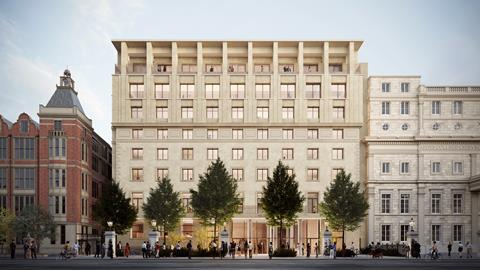Scheme believed to be largest Passivhaus scheme in UK set to complete in 2027
The London School of Economics and Political Science has appointed McLaren to carry out a £100m Passivhaus retrofit and extension job on one of its central London properties.
The scheme, drawn up by David Chipperfield Architects, will transform and build onto a 1950s building at 35 Lincoln’s Inn Fields to create a home for the Firoz Lalji Global Hub.

Around 60% of the original building will be retained, with the top three floors and roof plant enclosure set to be demolished.
These floors will be replaced by a cross-laminated timber extension which will take the building from 9,856 sq m to 11,848 sq m.
Meanwhile, the removal of an infill structure in the centre of the building will create an atrium, while a new ground floor and partial first floor slab will facilitate level access.
It is expected to be the largest Passivhaus retrofit building in the UK.
The building will house the Firoz Lalji Institute for Africa, as well as additional space for the Department of Mathematics, Department of Statistics, Executive Education and Data Science Institute.
It includes lecture halls and seminar rooms, breakout areas, ancillary offices, a dining area, external terrace and a ground floor café. A multi-purpose teaching and debating space with 270 seats, to be known as LSE Agora, will be used for high profile debates and broadcasts.
>> Read more: In pictures: LSE reveals shortlisted designs for £120m Lincoln’s Inn Fields hub
>> Read more: McLaren rejig sees regeneration boss take on new role
The external appearance of the brick building, which sits in the Strand Conservation Area between two listed buildings, will be refreshed with a lime-based, off-white wash brush.
McLaren Construction’s managing director for London & South, Darren Gill, said:, “Retrofit techniques have advanced to the point where we can remodel 70-year-old buildings to create world-class spaces at the same time as minimising both the embodied carbon in a construction project and the future operational carbon emissions.”
“With the new LSE Agora, McLaren will be responsible for creating a space that will become an iconic symbol of London’s open academic life around the world.”
Buro Happold is the carbon consultant on the scheme, which is scheduled to complete in 2027.























No comments yet